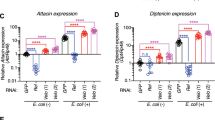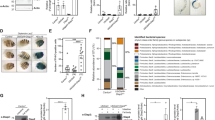Abstract
Regulating the nuclear factor-κB (NF-κB) family of transcription factors is of critical importance to animals, with consequences of misregulation that include cancer, chronic inflammatory diseases and developmental defects1. Studies in Drosophila melanogaster have proved fruitful in determining the signals used to control NF-κB proteins, beginning with the discovery that the Toll/NF-κB pathway, in addition to patterning the dorsal–ventral axis of the fly embryo, defines a major component of the innate immune response in both Drosophila and mammals2,3. Here, we characterize the Drosophila wntD (Wnt inhibitor of Dorsal) gene. We show that WntD acts as a feedback inhibitor of the NF-κB homologue Dorsal during both embryonic patterning and the innate immune response to infection. wntD expression is under the control of Toll/Dorsal signalling, and increased levels of WntD block Dorsal nuclear accumulation, even in the absence of the IκB homologue Cactus. The WntD signal is independent of the common Wnt signalling component Armadillo (β-catenin). By engineering a gene knockout, we show that wntD loss-of-function mutants have immune defects and exhibit increased levels of Toll/Dorsal signalling. Furthermore, the wntD mutant phenotype is suppressed by loss of zygotic dorsal. These results describe the first secreted feedback antagonist of Toll signalling, and demonstrate a novel Wnt activity in the fly.
This is a preview of subscription content, access via your institution
Access options
Subscribe to this journal
Receive 51 print issues and online access
$199.00 per year
only $3.90 per issue
Buy this article
- Purchase on Springer Link
- Instant access to full article PDF
Prices may be subject to local taxes which are calculated during checkout




Similar content being viewed by others
References
Hayden, M. S. & Ghosh, S. Signaling to NF-kappaB. Genes Dev. 18, 2195–2224 (2004)
Beutler, B. Inferences, questions and possibilities in Toll-like receptor signalling. Nature 430, 257–263 (2004)
Lemaitre, B. The road to Toll. Nature Rev. Immunol. 4, 521–527 (2004)
Rushlow, C. A., Han, K., Manley, J. L. & Levine, M. The graded distribution of the dorsal morphogen is initiated by selective nuclear transport in Drosophila. Cell 59, 1165–1177 (1989)
Morisato, D. & Anderson, K. V. The spatzle gene encodes a component of the extracellular signalling pathway establishing the dorsal-ventral pattern of the Drosophila embryo. Cell 76, 677–688 (1994)
Belvin, M. P., Jin, Y. & Anderson, K. V. Cactus protein degradation mediates Drosophila dorsal-ventral signalling. Genes Dev. 9, 783–793 (1995)
Stathopoulos, A., Van Drenth, M., Erives, A., Markstein, M. & Levine, M. Whole-genome analysis of dorsal-ventral patterning in the Drosophila embryo. Cell 111, 687–701 (2002)
Llimargas, M. & Lawrence, P. A. Seven Wnt homologues in Drosophila: a case study of the developing tracheae. Proc. Natl Acad. Sci. USA 98, 14487–14492 (2001)
Ganguly, A., Jiang, J. & Ip, Y. T. Drosophila WntD is a target and an inhibitor of the Dorsal/Twist/Snail network in the gastrulating embryo. Development 132, 3419–3429 (2005)
Gillespie, S. K. & Wasserman, S. A. Dorsal, a Drosophila Rel-like protein, is phosphorylated upon activation of the transmembrane protein Toll. Mol. Cell. Biol. 14, 3559–3568 (1994)
Drier, E. A., Govind, S. & Steward, R. Cactus-independent regulation of Dorsal nuclear import by the ventral signal. Curr. Biol. 10, 23–26 (2000)
Logan, C. Y. & Nusse, R. The Wnt signalling pathway in development and disease. Annu. Rev. Cell Dev. Biol. 20, 781–810 (2004)
Hamada, F. et al. Negative regulation of Wingless signalling by D-axin, a Drosophila homolog of axin. Science 283, 1739–1742 (1999)
Rusch, J. & Levine, M. Regulation of the dorsal morphogen by the Toll and torso signalling pathways: a receptor tyrosine kinase selectively masks transcriptional repression. Genes Dev. 8, 1247–1257 (1994)
Lemaitre, B., Nicolas, E., Michaut, L., Reichhart, J. M. & Hoffmann, J. A. The dorsoventral regulatory gene cassette spatzle/Toll/cactus controls the potent antifungal response in Drosophila adults. Cell 86, 973–983 (1996)
Meng, X., Khanuja, B. S. & Ip, Y. T. Toll receptor-mediated Drosophila immune response requires Dif, an NF-kappaB factor. Genes Dev. 13, 792–797 (1999)
Choe, K. M., Werner, T., Stoven, S., Hultmark, D. & Anderson, K. V. Requirement for a peptidoglycan recognition protein (PGRP) in Relish activation and antibacterial immune responses in Drosophila. Science 296, 359–362 (2002)
Hedengren, M. et al. Relish, a central factor in the control of humoral but not cellular immunity in Drosophila. Mol. Cell 4, 827–837 (1999)
De Gregorio, E., Spellman, P. T., Tzou, P., Rubin, G. M. & Lemaitre, B. The Toll and Imd pathways are the major regulators of the immune response in Drosophila. EMBO J. 21, 2568–2579 (2002)
Green, C. et al. The necrotic gene in Drosophila corresponds to one of a cluster of three serpin transcripts mapping at 43A1.2. Genetics 156, 1117–1127 (2000)
Lemaitre, B. et al. Functional analysis and regulation of nuclear import of dorsal during the immune response in Drosophila. EMBO J. 14, 536–545 (1995)
Bettencourt, R., Asha, H., Dearolf, C. & Ip, Y. T. Hemolymph-dependent and -independent responses in Drosophila immune tissue. J. Cell. Biochem. 92, 849–863 (2004)
Lemaitre, B. et al. A recessive mutation, immune deficiency (imd), defines two distinct control pathways in the Drosophila host defense. Proc. Natl Acad. Sci. USA 92, 9465–9469 (1995)
Gross, I., Georgel, P., Kappler, C., Reichhart, J. M. & Hoffmann, J. A. Drosophila immunity: a comparative analysis of the Rel proteins dorsal and Dif in the induction of the genes encoding diptericin and cecropin. Nucleic Acids Res. 24, 1238–1245 (1996)
Mansfield, B. E., Dionne, M. S., Schneider, D. S. & Freitag, N. E. Exploration of host-pathogen interactions using Listeria monocytogenes and Drosophila melanogaster. Cell. Microbiol. 5, 901–911 (2003)
Brandt, S. M. et al. Secreted bacterial effectors and host-produced Eiger/TNF drive death in a Salmonella-infected fruit fly. PLoS Biol 2, e418 (2004)
Zambon, R. A., Nandakumar, M., Vakharia, V. N. & Wu, L. P. The Toll pathway is important for an antiviral response in Drosophila. Proc. Natl Acad. Sci. USA 102, 7257–7262 (2005)
Zettervall, C. J. et al. A directed screen for genes involved in Drosophila blood cell activation. Proc. Natl Acad. Sci. USA 101, 14192–14197 (2004)
Rorth, P. Gal4 in the Drosophila female germline. Mech. Dev. 78, 113–118 (1998)
Dionne, M. S., Ghori, N. & Schneider, D. S. Drosophila melanogaster is a genetically tractable model host for Mycobacterium marinum. Infect. Immun. 71, 3540–3550 (2003)
Acknowledgements
We thank J. Brown for preparing WntD protein for antibody production; C-H. Wu and K. Xu for preliminary experiments with wntD; M. Fish for p-element transformations; J. Sekelsky and K. Golic for fly strains and vectors used in gene targeting; S. Roth, G. Zimmermann and the Developmental Studies Hybridoma Bank for antibodies; A. O'Reilly and the Bloomington Stock Center for fly stocks; and C. Logan and A. Mikels for reading of the manuscript. M.D.G. was supported by a Howard Hughes Medical Institute predoctoral fellowship and a Stanford Graduate Fellowship. This work was supported by grants from the NIH to R.N. and D.S.S. and by the Howard Hughes Medical Institute.
Author information
Authors and Affiliations
Corresponding author
Ethics declarations
Competing interests
Reprints and permissions information is available at npg.nature.com/reprintsandpermissions. The authors declare no competing financial interests.
Supplementary information
Supplementary Methods
A description of methods used in performing wnt8 gene disruption and producing Wnt8 antibodies. (DOC 26 kb)
Rights and permissions
About this article
Cite this article
Gordon, M., Dionne, M., Schneider, D. et al. WntD is a feedback inhibitor of Dorsal/NF-κB in Drosophila development and immunity. Nature 437, 746–749 (2005). https://doi.org/10.1038/nature04073
Received:
Accepted:
Published:
Issue Date:
DOI: https://doi.org/10.1038/nature04073
This article is cited by
-
Determining zebrafish dorsal organizer size by a negative feedback loop between canonical/non-canonical Wnts and Tlr4/NFκB
Nature Communications (2023)
-
A chelicerate Wnt gene expression atlas: novel insights into the complexity of arthropod Wnt-patterning
EvoDevo (2021)
-
Cross-species analysis of viral nucleic acid interacting proteins identifies TAOKs as innate immune regulators
Nature Communications (2021)
-
Wnt5a is a TLR2/4-ligand that induces tolerance in human myeloid cells
Communications Biology (2019)
-
Assembly of protein complexes restricts diffusion of Wnt3a proteins
Communications Biology (2018)
Comments
By submitting a comment you agree to abide by our Terms and Community Guidelines. If you find something abusive or that does not comply with our terms or guidelines please flag it as inappropriate.



